Cannabidiol (CBD) is one of the more well-known active components in a cannabis plant. While CBD has been growing in popularity over the years, there’s still some confusion about how much CBD you need to manage ailments. Most packaging labels do not include the amount to take, which leaves you unsure of the recommended CBD dose.
How Much CBD Should I Take?
You may be wondering why your CBD oil doesn’t have a Recommended Daily Intake (RDI) like most vitamins and supplements. Well, the Food and Drug Administration (FDA) has yet to provide a regulated serving size for CBD. Therefore, there isn’t a one-size-fits-all CBD dosage.
Because CBD has a complex relationship with the brain and body and everyone’s physiology is different, implementing an official recommended dosage has proven challenging. Plus, more research would need to be done. However, some CBD manufacturers may provide their dosage recommendations, but only as a general point of reference.
Some CBD oil labels may read, “take one teaspoon” or “take two droppers,” but this generic amount may not be as adequate for your situation. There are too many variables to consider, such as your weight, gender, health condition for usage, and other body composition factors, as well as the form of CBD you choose and its potency level. So rather than rely on a general suggested amount, it’s best to use trial and error to determine the correct dosage for your needs.
How To Find Your Optimal CBD Dose
First, you should decide on a starting dose or serving size in milligrams. Generally, the starting point is between 1-6 milligrams per 10 pounds of body weight, considering the severity of the ailment or discomfort.
Whether you’re using CBD for restlessness or to experience the overall CBD benefits, it’s best to start low, especially if you’re new to CBD. Additionally, beginning with a low dose will help you avoid unwanted effects that may happen from ingesting a higher quantity of CBD. If you experience any side effects, reduce the amount to the previous one that didn’t produce those results.
Adjust your dosage incrementally, taking your time to find the right amount. Also, keep track of how much you’re ingesting daily and what your body’s reactions are that day. Listening to your body is key to finding your optimal dosage.
Side Effects of CBD
Even though CBD is generally safe, some relatively minor side effects have been reported. The most common effects include dry mouth, appetite or mood changes, drowsiness or dizziness, nausea, vomiting, and diarrhea.
If you’re still unsure about the CBD dose strategy and concerned about the side effects, you can always seek the advice of a medical professional. And check out our site for all your CBD and health and wellness needs.





